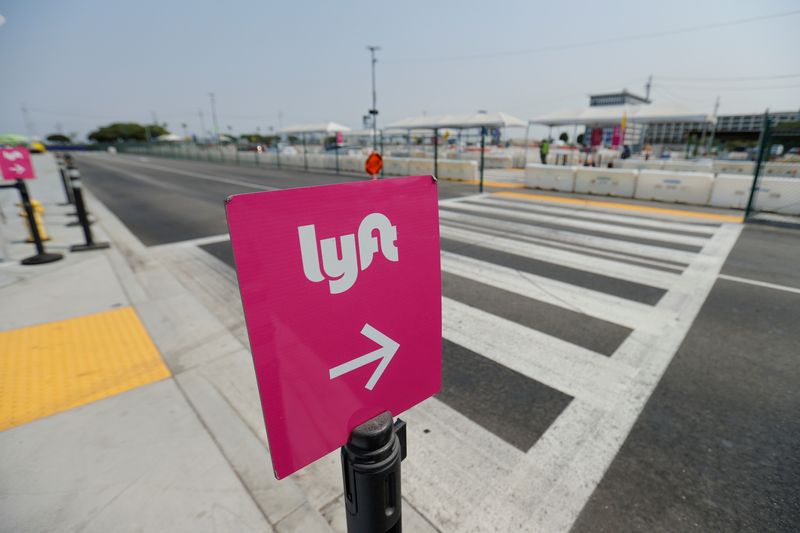Explainer-How a U.S. rule on independent contracting will affect workers, businesses
2022.10.12 02:19
[ad_1]
2/2

© Reuters. An empty Lyft pick-up area is shown as rideshare drivers hold a rally as part of a statewide day of action to demand that ride-hailing companies Uber and Lyft follow California law and grant drivers “basic employee rights”, in Los Angeles, California, U.
2/2
By Daniel Wiessner
(Reuters) – The U.S. Department of Labor on Tuesday unveiled a proposal that would make it harder for companies to treat workers as independent contractors, potentially upending the gig economy and other industries that rely heavily on contract labor.
The line between when a worker is considered a company’s employee, who is entitled to various legal protections, or an independent contractor has shifted over the last decade, as businesses have faced an increasing number of lawsuits by workers who claim they were misclassified.
WHY IS WORKER CLASSIFICATION IMPORTANT?
Most federal and state labor laws, such as those requiring a minimum wage and overtime pay, prohibiting discrimination or protecting the right to unionize, only apply to a company’s employees. This makes employees much more expensive for companies to use than independent contractors – up to 30% more, according to some studies.
Worker advocates have said that millions of workers are misclassified as independent contractors and deprived of fair wages, benefits, and basic protections against discrimination and retaliation. Business groups have maintained that independent contracting helps to create jobs and gives workers more flexibility and opportunities to operate their own businesses.
WHAT IS THE CURRENT LAW?
In the final days of the Trump administration last year, the Department of Labor adopted a rule favored by business groups that makes it easier to classify workers as independent contractors under federal wage law. The rule says workers who own their own businesses or have the ability to work for competing companies, such as a driver who works for Uber (NYSE:) and Lyft (NASDAQ:), can be treated as contractors.
The Biden administration withdrew the rule, but a federal judge in Texas ruled in March that it had not followed the proper procedure for doing so and reinstated the prior standard.
WHAT WOULD THE BIDEN ADMINISTRATION PROPOSAL DO?
The proposal unveiled on Tuesday would require a company to treat workers as employees when they are “economically dependent” on the company for work. The Labor Department said it will consider whether workers have an opportunity for profit or loss, the permanency of their jobs, and the degree of control a company exercises over a worker, among other factors. The proposal is similar to legal guidance issued during the Obama administration that was withdrawn by the Labor Department under former President Donald Trump, a Republican.
The agency must now collect and review public comments, so the rule will likely not be finalized until well into next year.
WHICH INDUSTRIES WILL BE AFFECTED MOST?
Any change in policy is expected to have a negative impact on an array of industries including retail and manufacturing, but the effect on the explosive growth of the “gig economy,” which heavily relies on independent contractors, has received the most attention. Last year, U.S. Labor Secretary Marty Walsh told Reuters that many gig workers should be classified as employees.
Limiting independent contracting would also have an outsized impact on trucking companies that rely on contractors who own their trucks to meet fluctuations in demand and avoid the costs of maintaining fleets of trucks. Trucking firms raising prices or limiting services could, in turn, place further strain on supply chains that have already been hobbled by the COVID-19 pandemic.
HOW WOULD THE RULE AFFECT WORKERS?
The proposed changes would be a boon to many workers by guaranteeing them the minimum wage, overtime pay and reimbursements for mileage and some other work-related expenses. Many gig and delivery workers currently work long hours for low pay and lack safety nets, such as paid – or even unpaid – time off, according to worker advocates.
At the same time, limiting independent contracting could lead some companies to slash the number of workers they hire, eliminating some jobs altogether. Companies would have greater control over workers who are considered employees and have more say over when and where work is performed.
WILL THERE BE LEGAL CHALLENGES TO THE RULE?
Almost certainly, given the significant impact it will have. Lawsuits targeting the final rule could claim that the new definition of “employee” is broader than federal wage law allows or that the Department of Labor did not follow the proper administrative procedures in adopting the rule.
Trade groups and individual companies and workers could also bring claims under the U.S. Constitution or argue that the rule conflicts with existing regulations on specific industries.
[ad_2]
Source link








